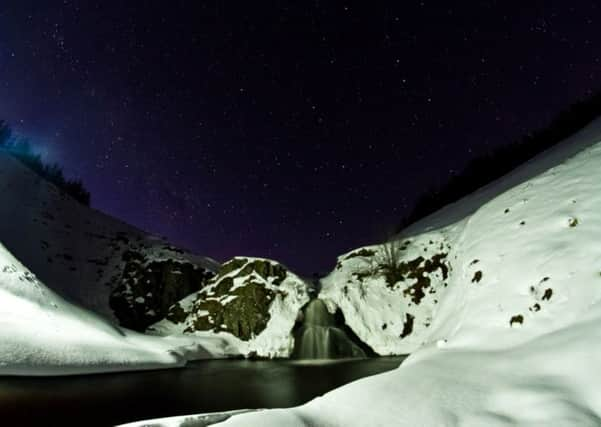Boom in astro-tourism as Northumberland celebrates three years of dark skies


To mark its success, Northumberland National Park and other dark-sky destinations, including Kielder Water and Forest Park, are hosting a series of stargazing events as well as promoting the message of dark-sky conservation.
Market research carried out after a dark-skies autumn and winter marketing campaign found that 63 per cent of respondents had visited the county between October 2015 and February 2016, compared to 9.5 per cent the previous year. Over 50 per cent said seeing the campaign probably or definitely turned a possible visit into a certainty.


Advertisement
Hide AdAdvertisement
Hide AdDark Sky Park status is one of a growing number of reasons why Northumberland National Park and Kielder Water & Forest Park are becoming increasingly recognised as year-round tourism destinations.
Earlier this year, detailed satellite maps of England’s light pollution and dark skies released by the Campaign to Protect Rural England (CPRE), showed that Northumberland is the darkest National Park with 96 per cent of the area having pristine night skies and very little light pollution elsewhere. The satellite imagesm captured at 1.30am throughout September 2015, also show that Northumberland as a county came out on top in the darkest category with the highest percentage of night skies free of light pollution at 72 per cent.
While Northumberland stands out as an exemplary area, the research comes at a time of increasing awareness of the harmful effects light pollution can have on the health of people and wildlife.
Duncan Wise, visitor development and marketing manager at Northumberland National Park, has been working hard to combat light pollution and promote the benefits that dark-sky recognition brings to the region.


Advertisement
Hide AdAdvertisement
Hide AdHe said: “Northumberland is Europe’s largest area of protected night sky at 572 square miles, making it officially the best place in England for people to enjoy the heavens. As a lead member of The Dark Sky Steering Group, we are committed to working with our partners, local communities and business owners to ensure its preservation.
“In all our activities, we seek opportunities to preserve and improve the situation. A new Good Practice Guide for Outside Lighting in Northumberland International Dark Sky Park has been published this year to help developers and local residents understand more easily how to minimise light pollution through the correct choice and installation of fully-shielded outside lighting.
“Working closely with the county council, Northumberland National Park Authority also offers pre-planning advice on how all developments, large and small, can preserve the Dark Sky Park and improve the dark skies surrounding it.
“Right across Northumberland, tourism businesses are welcoming more and more visitors from far and wide, who are seeking a peek at the stars. This increase in visitors, especially during the winter months, is boosting occupancy rates and generating lots of new business opportunities connected to astro-tourism for local people.


Advertisement
Hide AdAdvertisement
Hide Ad“Wherever possible, we work hard to ensure they get the most from Northumberland’s dark-sky status. This includes dark-sky tourism events held throughout the National Park, business workshops to introduce and train local tourism companies on dark skies to help them give their guests a world-class visitor experience. And due to its success, there are also plans to extend the dark-skies marketing campaign over the next two years.”
Lynn Turner, director of the Kielder Water & Forest Park Development Trust, said: “The Dark Sky Park designation has proved immensely popular for visitors to the Kielder area and the development of Kielder Observatory has been a magnificent addition to this area.
“People are so used to the light pollution that invades most parts of the UK, that being in the Kielder Water & Forest Park at night is a rare and incredibly moving experience, especially on a night free from cloud cover. The fact that the Dark Sky Park sits at the heart of one of the most naturally beautiful parts of the UK is just another fantastic reason to visit Northumberland.”
To celebrate the third anniversary of the Northumberland International Dark Sky Park, there is a dazzling array of astronomy events planned for people of all ages to enjoy, ranging from Night Sky Safaris at Kielder Observatory and Night Sky Tours at Battlesteads Hotel to an evening of stargazing with expert commentary and advice from the National Park’s Starmakers.


Advertisement
Hide AdAdvertisement
Hide AdNorthumberland National Park is also hosting a special Geminids Meteor Shower night at Walltown on Tuesday, December 13, between 8pm and 10pm, and the Redesdale Arms is holding a Geminids weekend this Friday and Saturday.
For more information, visit www.visitnorthumberland.com/darkskies